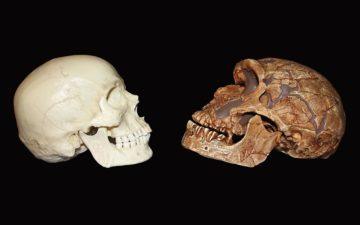Sara Reardon in Nature:
 More than 500,000 years ago, the ancestors of Neanderthals and modern humans were migrating around the world when a fateful genetic mutation caused some of their brains to suddenly improve. This mutation, researchers report in Science1,2, dramatically increased the number of brain cells in the hominins that preceded modern humans, probably giving them a cognitive advantage over their Neanderthal cousins.
More than 500,000 years ago, the ancestors of Neanderthals and modern humans were migrating around the world when a fateful genetic mutation caused some of their brains to suddenly improve. This mutation, researchers report in Science1,2, dramatically increased the number of brain cells in the hominins that preceded modern humans, probably giving them a cognitive advantage over their Neanderthal cousins.
“This is a surprisingly important gene,” says Arnold Kriegstein, a neurologist at the University of California, San Francisco. However, he expects that it will turn out to be one of many genetic tweaks that gave humans an evolutionary advantage over other hominins. “I think it sheds a whole new light on human evolution.”
When researchers first fully sequenced a Neanderthal genome in 20143, they identified 96 amino acids — the building blocks that make up proteins — that differ between Neanderthals and modern humans in addition to a number of other genetic tweaks. Scientists have been studying this list to learn which of these helped modern humans to outcompete Neanderthals and other hominins.
More here.
